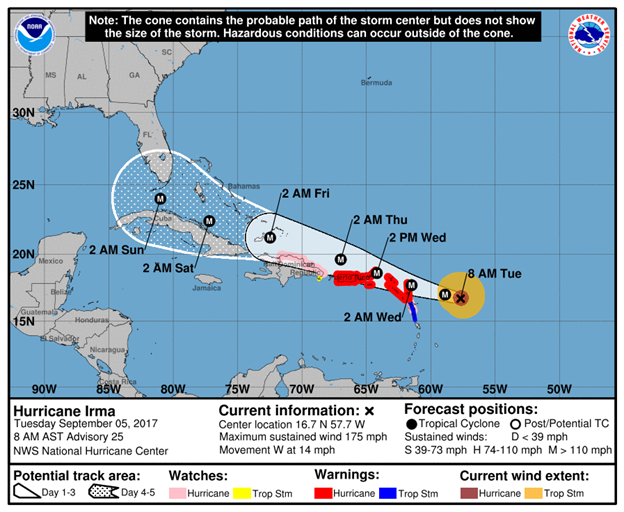Rain falls on Lexington as Irma moves over Atlantic
September 5, 2017
Cats may not like water, but Wildcats could not avoid the rain on Tuesday morning.
While Friday’s rain was an effect of Hurricane Harvey, today’s rain came from a “very strong” cold front, according to Matt Dixon, the staff meteorologist and data coordinator at the UK Agricultural Weather Center.
However, the United States is possibly between two hurricanes, as Hurricane Harvey hit Texas last week and Hurricane Irma moves toward land.
This morning, Irma was upgraded to a Category 5 hurricane with maximum sustained winds of 175 mph. This is the most intense classification, Dixon said.
Dixon said that while it’s too far out to know if Irma will reach the mainland, “chances are increasing that it very well could.”
Any impact is not expected until this weekend, but “it never hurts” to start planning early, Dixon said.
Currently, Irma is in over the Atlantic Ocean. The National Hurricane Center forecast cone currently shows a track just north of Puerto Rico and the Dominican Republic. This track is potentially south of Florida.
Harvey was a Category 4 hurricane when it hit Texas’s coast. Dixon said it’s rare for two or more major hurricanes to make landfall in one year. It last happened in 2005.
“While many remember Hurricane Katrina, 2005 also brought major Hurricanes Dennis, Rita and Wilma,” Dixon said.
As a landlocked state far from any coast, Kentucky does not have to worry about hurricanes, but the rain they bring can reach the state. Places in southern Kentucky, such as Bowling Green and Glasgow, received heavy rainfall and even flooding after Harvey.
Any effects in Kentucky from Irma will depend on the exact track the hurricane ends up taking, Dixon said.
“Normally the remnants of any tropical systems hitting Kentucky come from the Gulf of Mexico,” Dixon said.
These remnants are not always bad: Hurricane Isaac in 2012 brought much-needed rain during a western Kentucky drought, Dixon said.




















































































































































